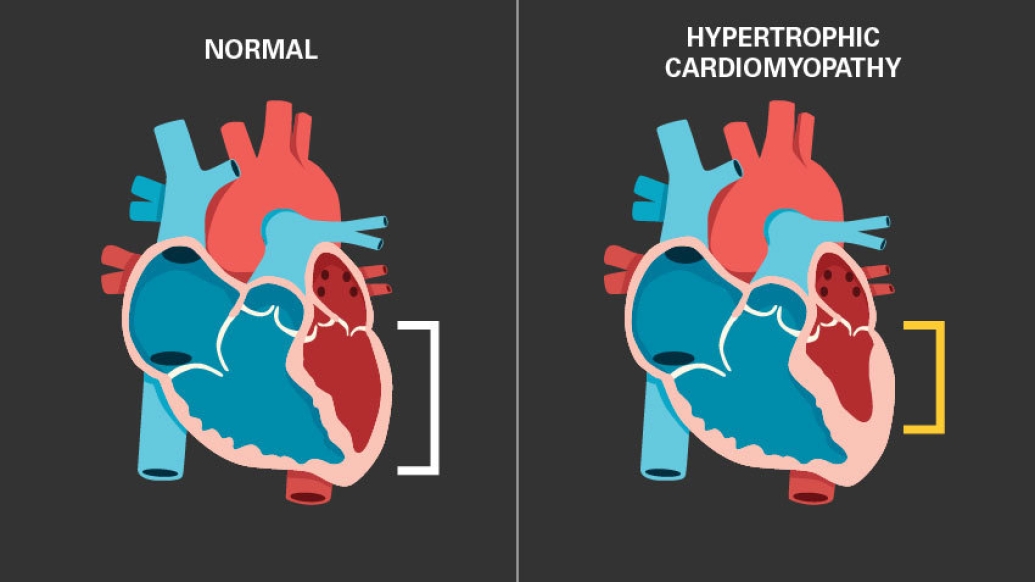A new drug being tested for hypertrophic cardiomyopathy changed the structure of the heart in a new report from a clinical trial.
3:07 PM
Author |

For the first time, a medication has impacted heart muscle thickness and function for patients with the most common inherited heart condition, rather than simply addressing their symptoms.
"This is the first study to show a favorable impact of a medication on cardiac structure and function in any form of hypertrophic cardiomyopathy," says Sara Saberi, M.D., an assistant professor of internal medicine and a cardiologist at the Michigan Medicine Frankel Cardiovascular Center.
Current options, Saberi explains, might help patients feel better today, but they don't help them live longer, nor do they prevent people from experiencing heart failure down the road. They also don't affect any of the heart structural abnormalities that define the disease: thickness of the heart muscle, resultant stiffness and abnormalities in other cardiac structures.
"There's a huge void. HCM is a chronic progressive disease that still does not have a cure," Saberi says.
She presented the results of her team's EXPLORER-HCM CMR sub-study at the 2020 American Heart Association Scientific Sessions, which published simultaneously in Circulation.
Addressing the underlying cause of HCM
In HCM, the motor proteins interact with each other too much, causing over-vigorous squeeze of the muscle and causing stiffness of the muscle.
A medication designed specifically for HCM, mavacamten, is currently being studied in a variety of clinical trials. It's part of a new class of drugs called cardiac myosin inhibitors. The medication works by blocking a protein called myosin from interacting too much with other motor proteins, which then allows the heart muscle to squeeze and relax more normally, Saberi explains. It is effective at reducing obstruction to blood flow within the heart that can occur with the disease.
"It's the first class of medications that actually targets the underlying pathophysiology of HCM."
The primary measure for this study, the mass of the heart, was significantly reduced in those patients taking the drug as opposed to those taking placebo, Saberi says.
In September, Saberi and colleagues published findings from the EXPLORER-HCM randomized controlled trial in The Lancet. The patients had significant improvements in obstruction to blood flow in the heart and said they felt better after taking the drug for 30 weeks. They showed improvements in markers like exercise capacity. Now, this substudy explores some of the reason why people may be feeling better, Saberi says.
Results from cardiac imaging
The substudy was done using imaging of the study participants' hearts.
"Cardiac MRI has such incredible visual and spatial resolution that you can accurately examine the heart's mass, volume, ejection fraction, or how well the blood is pumping, and fibrosis, which is the scar burden in the heart muscle," Saberi says.
Her team observed these encouraging results after just 30 weeks of treatment, which would be a plus for patients, Saberi says.
"It's also encouraging that we don't see a worsening in fibrosis along with the normalization in ejection fraction," she says. Patients originally had a very high ejection fraction, but after treatment it moved into the normal range.
Although HCM is considered a rare disease, it affects about one in 500 people, Saberi says, so there's a large need for more effective therapeutics.
The EXPLORER-HCM trial was a phase three trial that studied the use of mavacamten in obstructive HCM, and has moved into a five-year open-label extension. A concurrent phase two trial, MAVERICK-HCM, investigated safety and tolerability in non-obstructive HCM. Those participants are also in the five-year open-label extension study now. Saberi says a phase three trial that would look at how well it works for those patients with non-obstructive HCM would be the next step.
The medication is not currently available outside of a clinical trial setting, Saberi says.
Paper cited: "Mavacamten Favorably Impacts Cardiac Structure in Obstructive Hypertrophic Cardiomyopathy: EXPLORER-HCM CMR substudy analysis," Circulation. DOI: CIRCULATIONAHA/2020/052359DR1
Disclosure: MyoKardia Inc., the company that makes investigational drug mavacamten, funded the research and paid consulting fees to Saberi and other investigators.

Explore a variety of healthcare news & stories by visiting the Health Lab home page for more articles.

Department of Communication at Michigan Medicine
Want top health & research news weekly? Sign up for Health Lab’s newsletters today!





